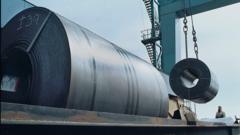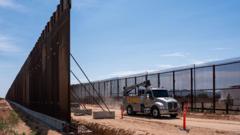**President Trump's recent tariff increase on steel and aluminium has raised concerns about economic impacts both within the US and among trade partners.**
**US Implements 50% Tariffs on Steel and Aluminium Imports**

**US Implements 50% Tariffs on Steel and Aluminium Imports**
**New trade measures expected to reshape US and global steel markets amidst mixed reactions.**
The United States has officially enacted a dramatic increase in tariffs on steel and aluminium imports, raising the import tax from 25% to a staggering 50%. This move, implemented by President Donald Trump, is aimed at bolstering the domestic steel industry by making foreign imports significantly more expensive. The new tariffs are set to take effect on Wednesday, marking the second increase since March.
Supporters of the tariffs argue that they are essential for protecting American jobs and industries. However, detractors warn that these tariffs could adversely affect foreign steel producers, spark retaliatory measures from other nations, and elevate costs for American businesses relying on these essential materials. Just hours prior to the announcement, many affected companies were expressing disbelief, hoping for a reconsideration of the plan.
Interestingly, the United Kingdom has been exempted from the latest increase, with tariffs remaining at the 25% level, a decision attributed to ongoing trade negotiations. Rick Huether, CEO of Independent Can Co., shared his anxiety about the substantial price hikes leading customers to seek alternatives, indicating a ripple effect of uncertainty in the market.
As the world's largest steel importer, the US mainly sources its steel from Canada, Brazil, Mexico, and South Korea. Trump's presidency has previously seen similar tariffs introduced, justified under national security concerns. However, many exemptions were granted during that time, which Trump has moved to eliminate. During a recent rally, he voiced his commitment to safeguarding the steel industry, asserting that the new tariffs would leave no room for foreign competition.
In response to the tariffs, there has been growing concern in both the UK and Europe. Trade representatives from the European Commission have been engaged in urgent discussions, while UK officials hope to finalize a trade agreement that mitigates the impact of the tariffs on UK exports. Gareth Stace, leader of UK Steel, cautioned that the 50% duty could be disastrous for UK exports, potentially leading to significant cancelations of orders.
Economists are warning of the potentially damaging broader economic impact of such tariffs. While the initial measures created some jobs in the steel industry, they also led to significant job losses in manufacturing and construction. Experts believe that doubling down on these tariffs will exacerbate the economic strain, particularly on industries dependent on steel and aluminium.
For businesses like Drill Rod & Tool Steels in Illinois, the new tariffs have immediately impacted finances, with increased costs leading to price hikes and reduced orders. The owner, Chad Bartusek, expressed his dismay upon learning of the tariff hike, predicting a future of cautious ordering and potential workforce reductions as businesses navigate these turbulent changes. "It's one punch after the other," he lamented, hoping for a swift resolution to the tumultuous situation.
Supporters of the tariffs argue that they are essential for protecting American jobs and industries. However, detractors warn that these tariffs could adversely affect foreign steel producers, spark retaliatory measures from other nations, and elevate costs for American businesses relying on these essential materials. Just hours prior to the announcement, many affected companies were expressing disbelief, hoping for a reconsideration of the plan.
Interestingly, the United Kingdom has been exempted from the latest increase, with tariffs remaining at the 25% level, a decision attributed to ongoing trade negotiations. Rick Huether, CEO of Independent Can Co., shared his anxiety about the substantial price hikes leading customers to seek alternatives, indicating a ripple effect of uncertainty in the market.
As the world's largest steel importer, the US mainly sources its steel from Canada, Brazil, Mexico, and South Korea. Trump's presidency has previously seen similar tariffs introduced, justified under national security concerns. However, many exemptions were granted during that time, which Trump has moved to eliminate. During a recent rally, he voiced his commitment to safeguarding the steel industry, asserting that the new tariffs would leave no room for foreign competition.
In response to the tariffs, there has been growing concern in both the UK and Europe. Trade representatives from the European Commission have been engaged in urgent discussions, while UK officials hope to finalize a trade agreement that mitigates the impact of the tariffs on UK exports. Gareth Stace, leader of UK Steel, cautioned that the 50% duty could be disastrous for UK exports, potentially leading to significant cancelations of orders.
Economists are warning of the potentially damaging broader economic impact of such tariffs. While the initial measures created some jobs in the steel industry, they also led to significant job losses in manufacturing and construction. Experts believe that doubling down on these tariffs will exacerbate the economic strain, particularly on industries dependent on steel and aluminium.
For businesses like Drill Rod & Tool Steels in Illinois, the new tariffs have immediately impacted finances, with increased costs leading to price hikes and reduced orders. The owner, Chad Bartusek, expressed his dismay upon learning of the tariff hike, predicting a future of cautious ordering and potential workforce reductions as businesses navigate these turbulent changes. "It's one punch after the other," he lamented, hoping for a swift resolution to the tumultuous situation.























